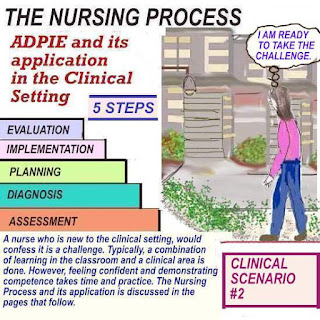CARDIOGENIC SHOCK AND CRITICAL THINKING
Scenario: Mrs. R is a 48 year-old female who has a history
of a previous myocardial infarction. She was admitted 2 days
ago with mild chest pain. She was resting comfortably when
she suddenly started feeling short of breath. She is anxious
and calls the nurse.
What actions did the nurse take?
-The nurse reassures Mrs. R. She does an assessment, vital signs
, and oxygen saturation. She gives oxygen per protocol.
-The nurse notifies the doctor of what has occurred and her
assessment findings. She also mentions the vital signs, low
oxygen saturation, and steps that were taken to correct the
saturation. The doctor gives further orders, including a
transfer to CCU.
Why chest pain assessment?
It must be remembered that a patient with heart damage
will also experience chest pain. Assessment of the pain
should also be included. This may be sharp, with radiation
to the shoulder/jaw, or it may feel like chest pressure.
Helpful Hint:
Chest pain should always be assessed.
Enjoy learning more about this topic by clicking on the link:
Simplifying Cardiogenic Shock
It must be remembered that a patient with heart damage
will also experience chest pain. Assessment of the pain
should also be included. This may be sharp, with radiation
to the shoulder/jaw, or it may feel like chest pressure.
Helpful Hint:
Chest pain should always be assessed.
Enjoy learning more about this topic by clicking on the link:
Simplifying Cardiogenic Shock
Hemodynamics refers to blood flow. The heart is a pump,
which pumps blood around the body. If there is damage,
like a myocardial infarction, the heart's function will be
impaired.
Learn more about: Congestive heart failure






Comments
Post a Comment